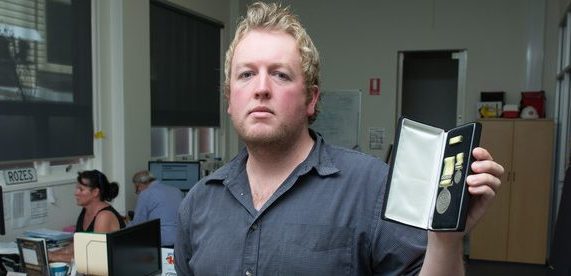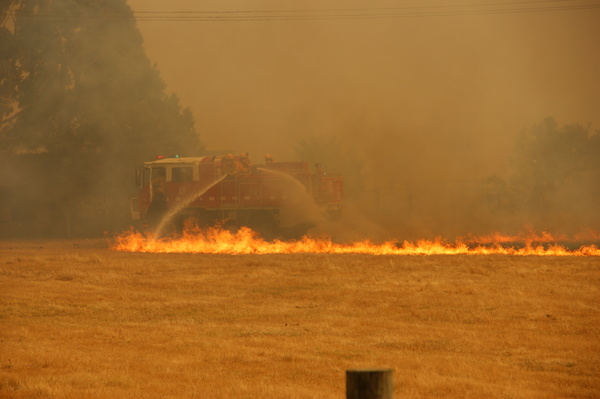By Russell Bennett
I was never cut out to be a firefighter. Anyone who knows me would agree – I could never be characterised as someone who’s mechanically-minded.
So I can only imagine what my brigade mates would have thought of me when I joined the CFA as a teenager more than 15 years ago.
I signed up at Gembrook, along with some of my childhood friends. We each had family members who’d been long established in the brigade, and who held leadership positions.
I’ve made no secret of the fact that my dad, Ian, is my idol. He no longer holds an active role with the Gembrook brigade, given his ongoing battle with Parkinson’s, but in 2014, at 68, he was presented with his 50-year CFA service medal – having left lasting legacies at each brigade he’d served in. That moment remains one of my proudest memories.
By that stage, I was no longer actively involved with Gembrook either – due to a range of other commitments – but I had been for about a decade, and I joined because of him.
When I first signed up, I felt so out of place – I didn’t felt brave or even particularly self-assured around a group of firefighters who I was honestly in awe of.
Even going through my training, I felt at least a step behind. In the practical tests, nothing came naturally to me.
But the encouragement I received from the brigade’s other members was endless.
It wasn’t long before I was turning out to incidents, and while my heart would always skip a beat when that pager went off – often in the dead of night – I knew that I was part of a team full of people who’d be there to pick me up if I fell.
We were builders, plumbers, retail workers, farmers, graphic designers, school teachers, mechanics, tree loppers, small business owners, students – and, yes, even writers.
At most of the incidents I attended, I was on the end of a fire hose. I guess in part it’s because the adrenaline would stop my brain getting in the way and the nerves from taking hold.
But I was never afraid to ask for backup, because I knew the best was there to support me – the decades of experience behind the calm heads.
Because of them, over time, my confidence grew and I felt at home right alongside them – together with them.
And during the Black Saturday fires, that’s what we did – we stood together, rolled the sleeves up and got to work in the same way that members of countless other brigades across the state did.
I remember it vividly – leaving the Gembrook station on the back of that tanker less than a week shy of my 22nd birthday.
I had no idea what the state was facing. I didn’t really know what we were facing, and I didn’t ask. Truthfully, I rarely did.
I just knew that there was a job to be done, and I was physically and mentally able to play a role.
As we drove out of town, headed towards the Bunyip State Park, I knew it was no ordinary February day. I’d never experienced stifling heat like it, and haven’t since.
Compounding that was the wind, the smoke, and the lack of visibility. Sitting on the back of a fire truck – facing backwards – is disorienting at the best of times, but that day I didn’t really know where I was until we arrived at the Bunyip Ridge fire.
Out by the powerlines, through the seemingly endless grey of smoke and ash, all I remember seeing was the red of the other trucks. It was strangely comforting.
The adrenaline was coursing through my body, and I can only imagine it was the same for every other firefighter in those trucks, but – again – I was calm in the knowledge that we were all there together.
My role that day was a simple one – to do as I was told. Again, I was on the end of a fire hose doing the simplest of tasks: “putting the wet stuff on the hot stuff” (as it was explained to me so simply in my early days in the brigade).
After our crew’s stint finished, we returned to the station for a changeover.
At that point, I still didn’t understand the enormity of the situation. In fact, when I eventually got home and went to sleep I shut my eyes knowing less than most people across the country about the battles facing our communities. It wasn’t until the next morning, when watching the rolling TV news bulletins across each station, that it finally hit me.
I can only speak for myself, as someone who was convinced he was never cut out to be a firefighter but came to realise he was.
As a volunteer who simply played his role during those fires, I was awarded a National Emergency Medal. I’ll never feel as humbled as I did that day. When I walked up on stage, I felt two feet tall because people I viewed as heroes surrounded me – the very people who I’d followed into the grey. When they spoke, I listened. When they gave me an instruction, I did it. They were giants to me – when I first joined, when I did my basic training, when I was on the fire ground, and when I was on that stage.
Now, every time I hear a fire siren on a hot summer’s day, I think back to early February 2009 and I have no doubt I’ll continue to for the rest of my life.
Why? Like anyone, because of the devastation and heartbreak that Black Saturday caused. But also because of what brought so many of us – from all walks of life – together to fight as one.








